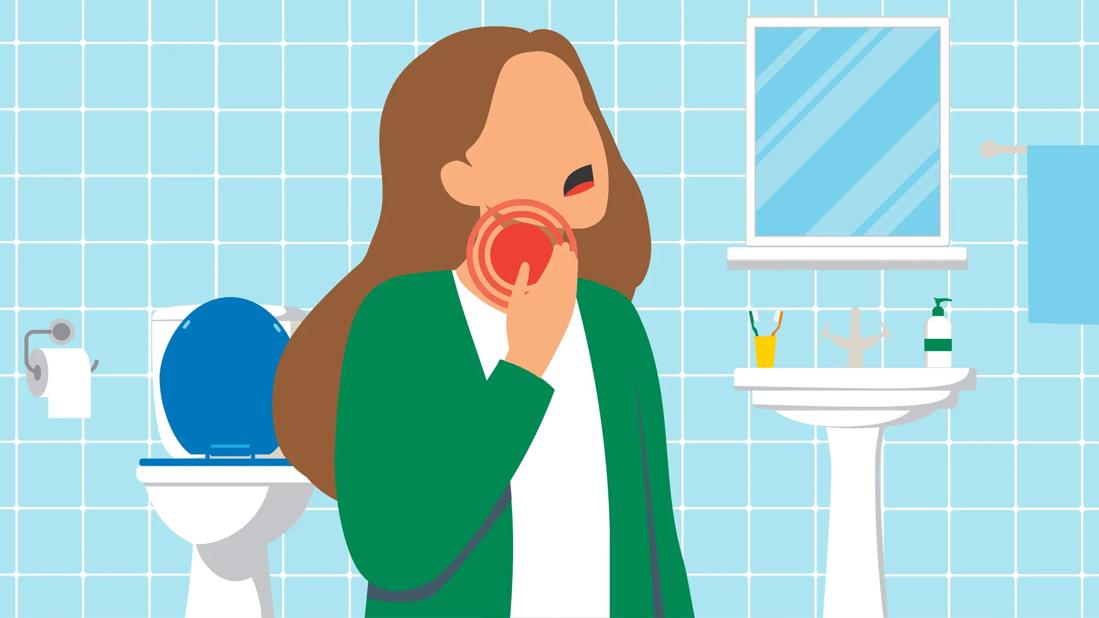Forceful vomiting and stomach acid in your esophagus can cause a sore throat that lasts days or even weeks

Image content: This image is available to view online.
View image online (https://assets.clevelandclinic.org/transform/d32bce25-2e0c-4ca6-8906-cfa09403c0f6/sore-throat-bathroom-2202421793)
Person with sore throat, standing in their bathroom at home
Being sick is bad enough. But sometimes, even once you feel better, you’re left with unwelcome, uncomfortable reminders of your illness — like a painful sore throat from vomiting.
Advertisement
Cleveland Clinic is a non-profit academic medical center. Advertising on our site helps support our mission. We do not endorse non-Cleveland Clinic products or services. Policy
“Throwing up takes a toll on your esophagus, the hollow tube that carries food from your throat down to your stomach,” explains family medicine doctor Charles Garven, MD.
The forceful motion of vomiting and the stomach acid that travels up and down your throat during the process can both contribute to esophagitis, painful inflammation of the esophagus.
Here’s a closer look at how vomiting can cause a sore throat:
Occasionally, you can vomit with so much force that you actually damage your esophagus, Dr. Garven notes. Make an appointment with a healthcare provider if:
Advertisement
“If you see blood in your vomit, that always warrants a visit with a provider,” he stresses. In rare cases, blood or severe pain could mean you’re dealing with an emergency condition like a Mallory Weiss tear (a split in the inner layer of your esophagus) or a spontaneous rupture of the esophagus (Boerhaave's syndrome).
If you’re dealing with run-of-the-mill throat pain after a bout of vomiting, there are steps you can take to find some relief. Here’s how to soothe what ails you.
“Gargling with saltwater can help reduce inflammation,” Dr. Garven says. “It also has an antibacterial aspect that may help prevent infection.”
To do it, stir a teaspoon of salt into a pint glass of warm or room temperature water (not too hot or too cold). Gargle some of the water in the back of your throat, then swish it around in your mouth before spitting it out in the sink.
Don’t drink any of the saltwater, which can further upset your stomach and contribute to dehydration.
Herbal tea is always a good go-to for a sore throat.
“Warm liquids like teas can provide a soothing sensation,” Dr. Garven says. “Just make sure it’s not too hot.”
Teas to try include:
Have you ever tried honey for a sore throat from strep or allergies? It can also help soothe the pain of esophagitis.
“Honey is an easy home remedy that has anti-inflammatory, anti-bacterial and other properties, all of which can be helpful,” Dr. Garven points out.
You can add up to 1 teaspoon of honey to warm water or tea, or you can swallow it on its own, straight from the spoon. (Just remember, never to give honey to children under 1.)
Just as important as what you do is what you don’t do.
“Generally, the best strategy is to avoid food and drinks that are hot, temperature-wise, as well as anything spicy or acidic,” Dr. Garven advises.
That means that while your esophagus is healing, it’s best to skip things like chili peppers, caffeine, orange juice and hot coffee. They can all make your throat feel worse and get in the way of your recovery.
OTC medications like acetaminophen (Tylenol®) or ibuprofen (Motrin® or Advil®) can help lessen some of the pain of post-vomiting esophagitis. A phenol throat spray can also relieve minor pain and irritation by temporarily numbing the affected area.
Always be sure to follow dosing instructions on the packaging.
Advertisement
These tips can help alleviate your pain. But for the most part, only time and rest can truly help heal a sore throat after throwing up. So, take it easy and do your best to be patient.
Mild esophagitis lasts just a few days, but it can take up to a few weeks for your throat to get back to feeling normal.
“It depends on how badly inflamed and irritated your esophagus is,” Dr. Garven says. “Once you’ve stopped throwing up, the healing process can begin.”
Advertisement

Sign up for our Health Essentials emails for expert guidance on nutrition, fitness, sleep, skin care and more.
Learn more about our editorial process.
Advertisement
People with an inflamed esophagus may also have other conditions that cause a nagging, persistent cough
What to know about dysphagia
Most oropharyngeal cancers can be traced to a virus that can be shared during oral sex
Wait a few hours, then start with water or ice chips, graduating to clear liquids and then, soft, bland foods
This spinning sensation is a symptom, not a condition, so you need to know what’s causing it before you can treat it
Making lifestyle changes can help reduce your blood pressure, but taking cinnamon supplements probably isn’t one of them
At-home treatments and lifestyle changes may help ease the symptoms and improve the appearance of varicose veins — but they aren’t a cure
Dairy, wheat, seafood, nuts and other foods may trigger inflammation
Although it could be used as a moisturizer, this new trend is not recommended
Communicating clear limits helps protect your time, energy and emotional well-being
High cholesterol can be genetic, but testing and treatment can lower your heart disease risk